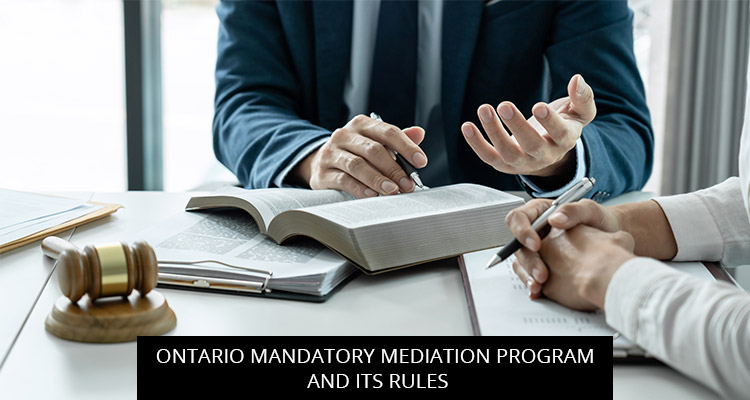
What Is Mediation?
Mediation is a process through which parties can settle the disputes outside of court with the help of a mediator. The main purpose of mediation is to provide less costly solutions to disputes by avoiding long legal battles.
Ontario Mandatory Mediation Program
In 1994, Ontario Civil Justice Review was conducted to develop a comprehensive strategy in order to establish an efficient civil justice system. The Review, indeed, played an exceptional role in consolidating the roots of mandatory mediation by believing that the best approach was to guarantee the adoption of mediation. As a result, the Mandatory Mediation Program (MMP) began as a pilot project to address the near paralysis of the justice system.
Moreover, according to the “Evaluation of the Ontario Mandatory Mediation Program (Rule 24.1): Final Report — The First 23 Months” (2001), the majority of both lawyers and petitioners were overall content with the mandatory mediation experience in that the project met its targets. Proponents of mandatory mediation advocated for its prompt application in order to diminish the redundant legal costs and ascend access to justice.
Despite encouraging findings, mandatory mediation was exposed to huge opposition and was not considered a perfect cure for the mounting number of disputes and the justice system. It is argued that the parties have inadequate information so early in the process to make informed decisions about settling – particularly in personal injury cases which can ultimately lead to frequent motions for extensions of time.
Today, mediation has proliferated in almost every area of law. The goal of MMP was to provide speedier resolution and a more streamlined process by maximizing public resources allocated to the justice system. Under the MMP, cases are referred to mediation early in the litigation process so that the parties can narrow the issues in dispute and participate diligently in the conflict resolution process. Ottawa was the first region to experiment with MMP for most (non-family) civil cases, followed by Toronto in 1999 and Windsor in 2002.
Where Does The Mandatory Mediation Program Apply?
Present-day mandatory mediation just applies in Ottawa, Toronto, and Windsor to certain (non-family) civil actions by-virtue-of Rule 24.1 of the Rules of Civil Procedure, while Rule 75.1 is related to mandatory mediation for contested estates, trusts, and substitute decision matters. Hence, the adoption of MMP was particularly a hallmark achievement for the government as inexplicable delay time was reduced without the need to recruit more judges or incur an expense of extra staff.
Rule 24.1: Mandatory Mediation For Civil Cases
Under Rule 24.1, many civil lawsuits in Ottawa, Toronto, and Windsor are primarily determined by mandatory mediation. Mediation, as per Rule 24.1, is conducted by a private-sector mediator. However, if the parties do not agree on a mediator then the Local Mediation Coordinator will appoint one for them who can administer the Mandatory Mediation Program.
The decision to choose the mediator must be made within 30 days of the filing. The mediation should take place within a period of three months soon after the filing of the first defense as mandated by Rule 24.1.09 of Rules of Civil Procedure. The mediation session can be postponed for an additional 60 days if both parties consent to a similar date in writing by bringing it to the notice of a mediation coordinator.
Rule 75.1: Mandatory Mediation – Estates, Trusts And Substitute Decisions
Conjunctively, Rule 75.1 of the Rules of Civil Procedure works for the cases concerning estates, trusts, and substitute decisions. The designated parties are expected to bring a motion for directions connecting with the conduct of the mediation within 30 days after the last day for serving a notice of presence. Following this motion, the parties have 30 days to choose a private-sector mediator from the Program’s roster or otherwise.
Moreover, as per Rule 75.1.08(1), a Statement of Issues has to be provided to the mediator and the other designated parties at least seven days before the mediation process starts. As far as the length of mediation sessions is concerned, the length majorly depends upon the intricacy of the case and how aptly the designated parties proceed in settlement conversations.
However, the key takeaway is that alternative dispute resolution is here to stay, in our civil procedure. As former Chief Justice of Ontario, Warren Winkler mentioned, “Mediation is a centerpiece in our civil justice reform.” In parts of Ontario, where courts are heavily utilized, there are presently three built-in procedures to mediate: mandatory mediation, pre-trial agreement, and judicial mediation.
Why Should Mandatory Mediation Be Chosen?
Mandatory mediation is a cooperative and interactive conflict resolution process where all stakeholders have a say at the table. Mediation assists the parties with accomplishing a fair and impartial settlement at the beginning phases of the conflict. Whether you are a supporter of mediation or not, the process is commanded in the Rules of Civil Procedure.
It would not be out of place to say that mediation is viewed as effective even if the parties fail to settle the issue because mediation helps the parties gain a better comprehension of the opposite party assuming they have limited the issues or settled a portion of the issues. Furthermore, the mediation process conserves and improves the relationship between the parties, it is not simply advantageous to them but also for the general public through expanded social harmony.
Note: Mandatory mediation is not composed as the ideal fix for everyone and it is not costless. Parties are encouraged, for the process to remain meaningful, to come to the bargaining table in all sincerity, hoping to arrive at a sensible settlement. To put it simply, there will always be cases preferred for an actual trial. Mandatory mediation does not quench that right and parties can still move along to a trial.
About The Firm
Ayaz Mehdi Professional Corporation is a full-service firm, based in Ontario, serving its clients by aptly handling all the litigation burden at the most reasonable prices. If you or someone you know needs legal help in navigating the Alternate Dispute Resolution (ADR) landscape, please contact us as successful mediation is directly linked with your right choice of mediator.
Disclaimer: Kindly note that sending or receiving information through this site does not establish a solicitor-client relationship. Legal matters are fact-specific, and the law is variably changing. The views expressed and the content provided on this blog are general guidelines and cannot substitute for proper legal advice. Schedule your legal consultation by clicking here: Let’s meet!




